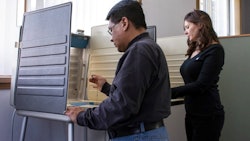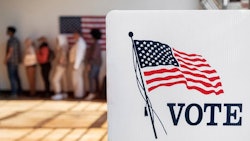
Adult-use cannabis legalization will have a chance at redemption in North Dakota Nov. 8, after a previous reform effort suffered a 20-point defeat in the state’s 2018 election.
This time around, New Approach North Dakota is leading the charge with a 2022 ballot measure that aims to kick off a regulated, licensed adult-use industry and allow those ages 21 and older to purchase, possess and consume cannabis.
The referendum, titled “Initiated Statutory Measure No. 2,” will be one of two voter initiatives to appear on North Dakota’s statewide ballot this year. Secretary of State Al Jaeger announced in August that he certified New Approach ND’s petition.
If supported by voters, the 2022 ballot proposal will legalize the possession of up to 1 ounce of cannabis, 4 grams of concentrate and up to 500 milligrams of THC in an infused product, as well as the personal cultivation of up to three cannabis plants at private residences.
The initiative also aims to establish a licensed industry for cultivation, processing, retail and testing laboratories, requiring the Department of Health and Human Services, or another department or agency designated by the state Legislature, to establish a licensed program by Oct. 1, 2023. Under the measure, seven cultivation facilities and 18 retailers would be licensed.
A July poll from The Dickinson Press surveying southwest North Dakota readers found that 39% of respondents said they supported the measure, 43% were opposed and 18% were apathetic. Sentiments in the area may have changed over four years, the newspaper suggests; a similar poll the paper conducted in 2018 saw southwestern North Dakotans supported that year’s adult-use legalization measure 60% to 40%, which reflected the inverse of the ultimate statewide vote outcome in 2018.
Will Adult-Use Legalization Diminish the Medical Market?
Because the 2022 measure would allow adults 21 and older to pay the same tax rates as the state’s medical program while also being allowed to purchase greater amounts of cannabis products, including edibles, state Medical Marijuana Division Director Jason Wahl told a legislative panel in September that the medical cannabis registry could shrink by at least 80%.
State officials have issued more than 8,200 medical cannabis cards to patients since voters approved Initiated Statutory Measure 5 in 2016 by a 64% margin.
North Dakota medical cannabis patients can currently purchase up to 2.5 ounces of dried flower in a 30-day period. Contrastingly, New Approach ND’s ballot measure offers expanded purchasing options, though consumers would be limited in individual transactions to purchasing 1 ounce of cannabis, 4 grams of concentrate and 500 milligrams of THC in an infused product.
However, under the 2022 measure, consumers could visit multiple dispensaries in one day and purchase more product than they are limited to during single store visits because “none of that is tracked,” Wahl told the legislative panel Sept. 12.
Cannabis in North Dakota’s Social and Political Landscape
With North Dakota being one of the most conservative states in the U.S., where a Republican trifecta in the governor’s office and both chambers of the Legislature has been in control since 1995, New Approach ND’s proposal is in line with the political makeup of the state in that it balances personal freedom with personal responsibility, Rep. Matthew Ruby, R-Minot, said in a public statement Aug. 15. Ruby is a member of the campaign’sNew Approach ND’s sponsoring committee.
According to advocacy group NORML, North Dakota has long had one of the highest cannabis arrests rates in the nation, despite having among the lowest reported marijuana use of any state.
The state Legislature decriminalized cannabis in 2019 through House Bill 1050.
According to the 2020 American Civil Liberties Union (ACLU) report, “A Tale of Two Countries: Racially Targeted Arrests in the Era of Marijuana Reform,” Black people in North Dakota were 5.5 times more likely than white people to be arrested for marijuana possession in 2018. That ratio trended higher than the ACLU’s finding that in the U.S. overall, Black people are 3.6 times more likely to be arrested for possession than white people.
Mark Friese, an attorney and former police officer who serves as New Approach ND’s campaign treasurer, said this election could resolve issues with state's criminal justice system.
“I served as a police officer in Bismarck for over five years and have defended those accused of marijuana offenses for the last 20 years,” he said in a public statement. “There is no public safety benefit from arresting adults for small amounts of marijuana. It is a waste of taxpayer resources and a distraction from serious public safety concerns. Cannabis causes far less harm than alcohol. Many people find therapeutic benefits from it. The government shouldn’t be in the business of punishing adults who use cannabis responsibly.”

























